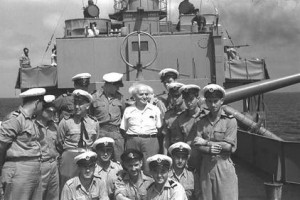By
Yagil Henkin
Most people forget that David Ben-Gurion’s most significant accomplishment, even more important than the declaration of the State of Israel, were his efforts to ensure its survival.
Has the Old Man Lost His Mind?
As soon as he was assigned the defense portfolio at the Jewish Agency (later to become Israel’s provisional government) in 1947, Ben-Gurion organized his own crash course to bring himself up to date. For several weeks, he met with representatives of each branch of the defense establishment and studied the organizational structure of the security forces – the Hagana. He checked out its equipment, commanders, and strategy, the kinds of threats it was prepared to repel, as well as the strength and capabilities of the Arab enemy forces. His conclusions were radical – as was his reaction. He replaced several of the Hagana’s leading figures and, more important, created a significant shift in its thinking. Hagana activists were still gearing up to fight yesterday’s war – an intensified replay of the civil unrest and riots of the Arab Revolt a decade earlier. Ben-Gurion demanded that his troops be prepared to face organized, fully equipped military forces – the armies of the neighboring Arab states, including the Arab Legion stationed in Transjordan – rather than the local rabble and volunteer units his commanders expected. Hearing Ben-Gurion’s insistence on a real army, complete with tanks, planes, cannons, and battleships, many of his colleagues declared the old man out of his mind.
But Ben-Gurion’s success in shifting attention to the impending military threat proved critical. As a result of his vision, tremendous energies were diverted to acquire planes, tanks, and cannons during the months preceding the declaration of the State of Israel – most of which arrived in the course of the War of Independence. It is appalling to imagine the fate of the Jewish community had its security forces fought that war equipped solely with the two tanks (only one of which worked) and the single fighter plane they’d had when the state was declared. The Arabs had dozens of tanks and aircraft at their disposal, and no lack of ammunition. Thanks to Ben-Gurion’s ongoing efforts, fighter planes and weapons were purchased from Czechoslovakia in 1947–1948, volunteers were recruited from Jewish communities worldwide as of January 1948, and ships loaded with firearms and ammunition sailed from Europe and the United States. Without the resulting shift in the balance of power, giving the IDF an advantage over the Arab forces on nearly all fronts by early 1949, it is doubtful whether the State could have been established at all, let alone been able to defend itself.
A United Army
Ben-Gurion’s military strategy in the War of Independence has generated extensive discussion, eliciting effusive praise from some quarters and the harshest criticism from others. His insistence on forcing a route to Jerusalem resulted in the tragic battles at Latrun; his bold, if not crude attempts to restructure the military led to “the Generals’ Revolt,” in which nearly the entire Hagana command threatened to resign one week before the State of Israel was declared; his central role in the destruction of the Irgun militia’s weapons on the Altalena evokes fistfights to this day; and many still resent his ruthless dissolution of the Palmah after the war.
After the War of Independence, despite the fragile peace, Ben-Gurion deemed the IDF too large. His radical restructuring and cutbacks resulted in the resignation of Chief of Staff Yigael Yadin in 1952. Yadin was convinced that Ben-Gurion was weakening the army and endangering Israel. But Ben-Gurion saw the IDF as just one component of Israel’s overall security, and reasoned that allocating an oversized portion of the tiny state’s budget and resources to the military would eventually jeopardize the entire country. Foreseeing little risk of war in the coming years, he preferred the short-term gamble of downsizing the army, allowing him to invest long-term in the new state’s many civilian needs.
Given the enormous challenge of mass immigrant absorption, Ben-Gurion even diverted army forces to the civilian tasks of education and infrastructure. The result was the basis of the IDF as we know it – a relatively small core of full-time soldiers backed by a much larger reserve force, with an emphasis on intelligence, the air force, and mobile ground forces (infantry and tanks).
Eighteen Points
Ben-Gurion arranged another “seminar” for himself in 1953, this time focusing on the optimal defense strategy for the State of Israel. The resulting “eighteen-point plan” has been the linchpin of Israel’s defense strategies ever since.
The plan included programs designed to turn the IDF into the “melting pot” of Israeli society: “A nation cannot fight if it is not united,” announced one of its clauses. The army was to provide employment in areas with heavily immigrant populations, settle immigrants with an eye to reinforcing Jerusalem and its environs as well as the south, and make the Galilee and Nazareth overwhelmingly Jewish.
Ben-Gurion was largely responsible for Israel’s victory in the War of Independence; his vision defined the IDF’s role within the State of Israel; and his defense policy has remained virtually unchanged for sixty years. The fact that all this was achieved by one person is extraordinary – even if the results were not perfect and the price they exacted was a heavy one. Who but David Ben-Gurion could have done so much?
Photo-credit: Ben Gurion with ship’s officers of Israeli navy boat, July 1949, Government Press Office For the fully illustrated article and Ben Gurion time-line see: http://segulaaaa.ravpage.co.il/form1
The words of this author reflect his/her own opinions and do not necessarily represent the official position of the Orthodox Union.




